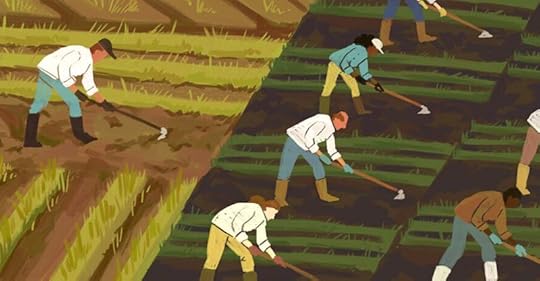We Need to Radically Reimagine Our Food System. Hereâs How.
 By Philip Loring
By Philip Loring A global food system that is both truly sustainable and sufficiently productive will consist, not of a few massively scaled practices, but rather a vast patchwork quilt of smaller scale solutions that vary dramatically from place to place, over space and over time, in an interplay with local climate, ecology and culture.
Radically reimagining our food systems is a task that is critical to solving the worldâs biggest social and ecological problems. Itâs also one that garners substantial and often heated debate.
But are we asking the right questions when it comes to evaluating what works, and what doesnât, for achieving more climate-friendly and food-secure futures?
Scholars and analysts are carefully exploring the potential of a wide range of solutions, from cellular agriculture to regenerative grazing, and asking whether they will scale â that is, whether they can be implemented widely around the globe.
We see this question in all manner of debates over food practices â for example, in claims that agroecology and organic agriculture cannot feed a growing population or that cattle are universally problematic.
In many cases, however, this is entirely the wrong question to ask, and the answers it generates lead us to downplay essential and potentially transformative solutions.
Industrial thinking
It seems sensible enough: If our current food production practices use too much water or emit too much greenhouse gas, we ought to replace them with practices that use less or generate less.
Better yet, we can replace them with practices that also reverse ecological harm and improve soil and water health while meeting current and future food needs.
However, evaluating radical new solutions based on whether they scale can be directly at odds with the very nature of these solutions.
Approaches like agroecology and regenerative grazing do not entail a set of standard practices meant to be implemented everywhere. Theyâre meant to be highly tailored and responsive to the specifics of a place.
It is effectively meaningless to evaluate one set of agroecological practices in say, Thailand, based on how those practices would perform if cloned and applied by different people of different cultures in different places around the world.
Scalability as a value derives from an industrial way of thinking: that the best solutions are those that can be replicated and implemented widely, and that uniformity breeds efficiency and productivity.
This may work in a factory, but ecosystems are not factories. Ecosystem productivity derives not from uniformity but from diversity, flexibility and change.
Accordingly, these, not scalability, are the traits that are key to success for the most exciting food systems innovations.
A patchwork of solutions
What this means is that a global food system that is both truly sustainable and sufficiently productive will consist, not of a few massively scaled practices, but rather a vast patchwork quilt of smaller scale solutions that vary dramatically from place to place, over space and over time, in an interplay with local climate, ecology and culture.
Consider the debate over animal-based proteins. It is not uncommon to see this presented as a sort of global average that implies inherent impacts, regardless of where and how those proteins are being produced.
Yet, there is tremendous place-based variability to how different kinds of livestock are raised. In western Ireland, cattle are used at a small scale to great effect for ecological restoration.
[…]
Via https://childrenshealthdefense.org/defender/reimagine-our-global-food-system/
The Most Revolutionary Act
- Stuart Jeanne Bramhall's profile
- 11 followers



